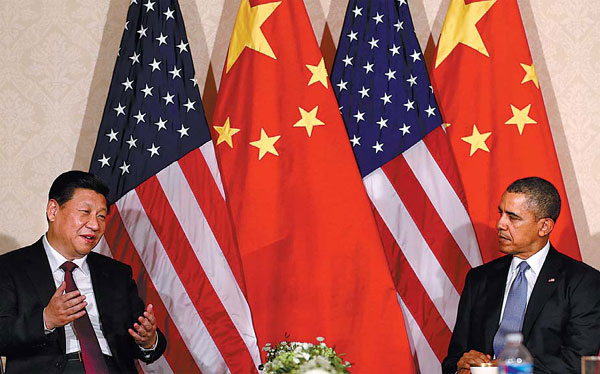US should adapt to changed geopolitics in Asia
Updated: 2015-02-12 07:38
By Han Dongping(China Daily)
|
||||||||
 |
|
Chinese President Xi Jinping meets with his US counterpart Barack Obama on the sidelines of the Nuclear Security Summit in The Hague on March 24, 2014. [Photo/Agencies] |
President Xi Jinping on Wednesday held phone talks with his US counterpart Barack Obama and accepted the latter's invitation to pay a state visit to the United States in September. Last week US National Security Adviser Susan Rice announced that the US invited President Xi Jinping to visit the United States this year. She also said that Japanese Prime Minister Shinzo Abe, South Korean President Park Geun-hye, and Indonesian President Joko Widodo, too, would visit the US this year.
By inviting the leaders of four Asian countries to the US in the same year, President Barack Obama seems to be making a last ditch effort toward the end of his eight years in office to make his hopeless "pivot to Asia" strategy a lasting legacy of his presidency.
This year marks the 70th anniversary of the end of World War II and the founding of the United Nations. At the end of World War II, Japan was devastated but only after wreaking havoc across many countries in Asia and the US emerged as the dominant power in the region as well as the rest of the world by using the UN, the International Monetary Fund and the World Bank as instruments to promote its national interests. That became possible partly because the US accounted for 50 percent of the global GDP and controlled 75 percent of the world's gold at the same time. Also, given its financial power, the US could afford to build bases across Asia and the world.
Recovering from the ruins of World War II, Japan rose to become the second-largest economy in the world, a position it had to yield to China because of China's meteoric economic rise since the early 1980s. The rise of China, formerly known as the "sick man of Asia", and its more than $3 trillion of foreign exchange reserves have changed many economic and political equations in the world.
World Bank calculations even show that the Chinese economy has surpassed that of the US in terms of purchase power parity. Although the calculations are not accepted by China, it indicates China's growing economic might.
In the political arena, China is playing an increasingly greater role in maintaining world peace. It is in this geopolitical context that Obama launched his "pivot to Asia" (or rebalancing to Asia) strategy. But so far, the strategy has been beneficial to neither the US nor the Asian countries it was meant to help.
The US' tacit support to Japan for "nationalizing" the Diaoyu Islands in the East China Sea raised tensions between China and Japan. The US support to the Philippines and Vietnam to dispute China's territorial claims in the South China Sea too has created tensions.
Amid these scenarios, Xi's visit to the US will be a great opportunity for the leaders of the two countries to candidly discuss the future course of Asia and the world. But more importantly, it's time the US adapted to the changed geopolitics in Asia and realized that unlike 70 years ago, it no longer holds the key to the global economy. It should also realize that all the rebalancing to Asia has to be led by the region's countries and their peoples in order to secure their future and ensure their security.
The author is a professor at Warren Wilson College and guest professor at Hebei University.
- Global health entering new era: WHO chief
- Brazil's planning minister steps aside after recordings revelation
- Vietnam, US adopt joint statement on advancing comprehensive partnership
- European border closures 'inhumane': UN refugee agency
- Japan's foreign minister calls A-bombings extremely regrettable
- Fukushima impact unprecedented for oceans: US expert

 Stars of Lijiang River: Elderly brothers with white beards
Stars of Lijiang River: Elderly brothers with white beards
 Wealthy Chinese children paying money to learn British manners
Wealthy Chinese children paying money to learn British manners
 Military-style wedding: Fighter jets, grooms in dashing uniforms
Military-style wedding: Fighter jets, grooms in dashing uniforms
 Striking photos around the world: May 16 - May 22
Striking photos around the world: May 16 - May 22
 Robots help elderly in nursing home in east China
Robots help elderly in nursing home in east China
 Hanging in the air: Chongqing holds rescue drill
Hanging in the air: Chongqing holds rescue drill
 2.1-ton tofu finishes in two hours in central China
2.1-ton tofu finishes in two hours in central China
 Six things you may not know about Grain Buds
Six things you may not know about Grain Buds
Most Viewed
Editor's Picks

|

|

|

|

|

|
Today's Top News
Liang avoids jail in shooting death
China's finance minister addresses ratings downgrade
Duke alumni visit Chinese Embassy
Marriott unlikely to top Anbang offer for Starwood: Observers
Chinese biopharma debuts on Nasdaq
What ends Jeb Bush's White House hopes
Investigation for Nicolas's campaign
Will US-ASEAN meeting be good for region?
US Weekly

|

|







